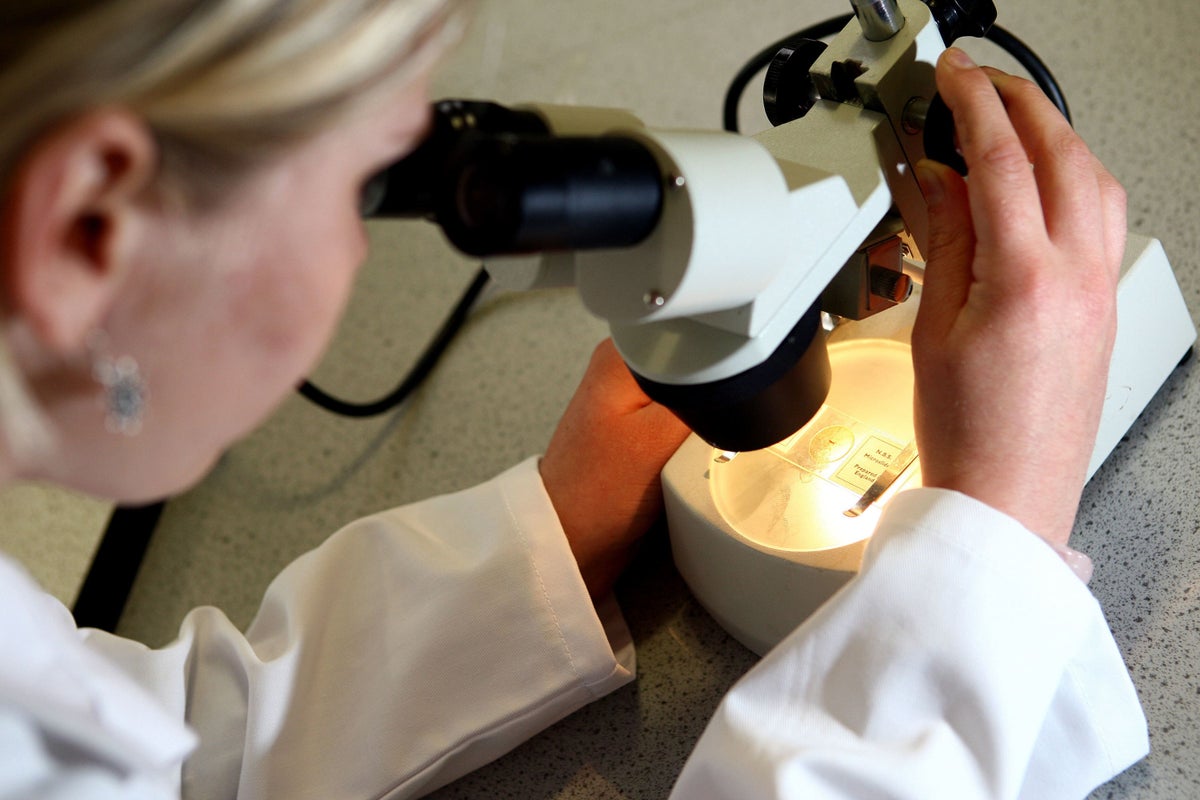
People have been urged to take up their offer of bowel cancer screening after a new study found the programme has helped to cut the number of cases of cancer.
Almost a third of people eligible for bowel cancer screening do not return their free at-home kits, NHS figures for England suggest.
But a new study has confirmed that screening “significantly lowers” bowel cancer rates.
Academics from the University of Bristol and University Hospitals Bristol and Weston NHS Foundation Trust set out to examine bowel cancer rates following the introduction of the screening programme in England in 2006.
They examined data on cancer rates in England between 2001 and 2017 among adults aged 60 to 74.
Their study, published in the journal Colorectal Disease, concluded that incidence of bowel cancer in the lowermost portion of the large bowel has decreased by approximately 15% following the introduction of the screening programme in England.
“Our results show that one of the benefits of screening people for bowel cancer is that there is a significant lowering of colorectal cancer incidence rates that is primarily driven by detecting and removing pre-cancerous polyps at colonoscopy,” said Adam Chambers, one of the study’s lead authors from the University of Bristol,
Bowel cancer screening is available for everyone aged 60 to 74 years with the programme set to expand to include all over 50s by 2025.
Screening can detect bowel cancer or pre-cancer before symptoms appear, so if you're invited for screening, please do take part, as it could save your life— Bowel Cancer UK
People are automatically sent a home test kit, called a faecal immunochemical test (FIT), every two years.
They need to collect a small sample of poo and send it to a lab where it is checked for tiny amounts of blood.
Microscopic amounts of blood could be a sign of bowel cancer or polyps, which are not cancer but could turn into cancer over time.
If these small amounts of blood are found then people could be sent off for further tests to confirm or rule out bowel cancer.
The screening programme helps find people who have disease but do not yet have any symptoms.
People of any age with symptoms of bowel cancer are encouraged to seek help from their GP, even if they have just completed a FIT test.
The three main symptoms of bowel cancer are having persistent blood in the stools, an ongoing change in bowel habit (such as needing to go more often or suffering the runs) and persistent lower abdominal pain, bloating or discomfort.
A loss of appetite may also occur, or somebody may suffer significant, unintentional weight loss.
There was a surge in people visiting the bowel cancer screening pages of the NHS website after the death of TV news presenter George Alagiah in July.
NHS England said visits to the ‘bowel cancer screening’ page jumped by 234% in the week after it was announced that the presenter had died, compared with the previous week.
Commenting on the study, Dr Lisa Wilde, director of research and external affairs at Bowel Cancer UK, said: “Screening is one of the best ways to detect bowel cancer early, and in some cases prevent it from developing in the first place.
“This research reinforces the importance of screening for bowel cancer and shows the potential impact of future improvements to the screening programme to make it more effective.
“Sadly, only one in 10 patients (10%) are diagnosed with bowel cancer through the national bowel cancer screening programmes in England and Wales.
“Screening can detect bowel cancer or pre-cancer before symptoms appear, so if you’re invited for screening please do take part as it could save your life. And if you’ve lost your kit or thrown it away you can request a new one by visiting the NHS bowel cancer screening website.”
Professor Peter Johnson, national clinical director for cancer at NHS England, said: “These findings show that being part of the bowel screening programme can make it less likely that people develop cancer, by finding changes at an early stage when they can be easily treated, especially for people who may not find it so easy to get diagnosed, and with the programme set expand to all over-50s by 2025 I hope to see more cases caught early and more lives saved.
“But we know currently almost a third of people do not return their FIT kits, meaning many cancers may go undetected and potentially progress, so I strongly urge those eligible to return their tests as soon as they can because early-stage bowel cancer does not typically show any symptoms.”







